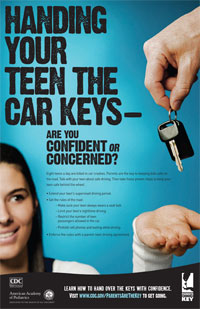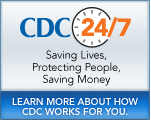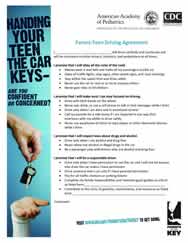Pediatricians and Safe Teen Driving

Spread the word about safe teen driving by distributing campaign materials and displaying campaign posters in waiting and examination rooms.
Car crashes take about 3,000 young lives every year—that’s 8 teen deaths a day. All new drivers—even straight ‘A’ students and “good kids”—are more likely than experienced drivers to be involved in a fatal crash.
Parents can play a key role in keeping their teens safe on the road. Yet parents are too often unaware of their teens’ risky driving habits. And the restrictions that parents place on their teens’ driving may not include those with proven safety benefits, such as limits on nighttime driving and restricting the number of teen passengers in the car.
Pediatricians can be valuable partners in helping families address this important health topic. Here are some key steps you can take:
- Educate parents and teens about the dangers of teen driving and steps they can take to reduce the risks. Parents and teens should discuss their family’s rules of the road and set consequences for breaking them.
- Encourage parents to reinforce these talks by working with their teen to complete a parent‐teen driving agreement. Find free copies of the “Parents Are the Key”/AAP parent‐teen driving agreement that you can hand out.
- Remind parents that they need to lead by example. They can’t wait until their teen is old enough to drive to start modeling good driving behaviors. If parents talk on the phone, text, speed or drive without their seat belt, so might their teen.
- Spread the word about safe teen driving by distributing campaign materials and displaying campaign posters in waiting and examination rooms. Free “Parents Are the Key” materials are available to order or download on the Materials page.

Pediatricians can be valuable partners in helping families keep their teens safe on the road.
Reduce the Risks
As a pediatrician, you talk to your patients and their parents about important milestones and their health implications. One such milestone, learning how to drive and getting a driver’s license, comes with great responsibility and risk. Discuss the following key areas with your teen patients and their parents:
- Driver Inexperience: Most crashes happen during the first year a teen has a license. Encourage parents to provide at least 30 to 50 hours of supervised driving practice over at least six months. They should practice on a variety of roads, at different times of day, and in varied weather and traffic conditions.
- Teen Passengers: Crash risk goes up when teens drive with other teens in the car. Parents should follow their state’s teen driving law for passenger restrictions. If your state doesn’t have such a rule, parents should limit the number of teen passengers to zero or one for at least the first six months.
- Nighttime Driving: For all ages, fatal crashes are more likely to occur at night; but the risk is highest for teens. Parents should make sure their teen is off the road by 9 or 10 p.m. for at least the first six months of licensed driving.
- Seat Belts: The simplest way to prevent car crash deaths is to buckle up. Parents should require their teen to wear a seat belt on every trip. This simple step can reduce their teen’s risk of dying or being badly injured in a crash by about half. Additionally, encourage parents to set a good example and always buckle up when in the car.
- Distracted Driving: Distractions increase a teen’s risk of being in a crash. Encourage parents to prohibit cell phone use, texting and other distracting behaviors while their teen is driving. Remind parents to set a good example by following the same rules in the car.
- Drowsy Driving: Young drivers are at highest risk for drowsy driving, which causes thousands of crashes every year. Parents should ensure their teen is fully rested before he or she gets behind the wheel.
- Reckless Driving: Research shows that teens lack the experience, judgment, and maturity to assess risky situations. Parent should stress the importance of avoiding unsafe behaviors, such as speeding and tailgating.
- Impaired Driving: Even one drink will impair a teen’s driving ability and increase the risk of a crash. Remind parents of the importance of being good role models—they should not drink and drive, and they should reinforce this message with their teen.
- Type of Vehicle Driven: Teens are more likely than older drivers to drive either smaller or older cars, especially when they own the car. While it may be tempting to choose a first car for a teen based on price or style, parents should consider a car’s safety features first and foremost.
Downloadable Materials
Tip Sheet for Pediatricians
Pediatricians and Safe Teen Driving [1.56MB]
Poster
Parents Are the Key/AAP 11x17 Poster [1.61MB]
Parents Are the Key/AAP Parent‐Teen Driving Agreement
Here is a sample of a parent-teen agreement you can use, co-branded with the AAP logo. Other versions are also available, such as through state departments of motor vehicles and some insurance companies. Whichever agreement you use, feel free to change it so that all of your family's rules—such as making sure everyone wears a seatbelt—are included.
Parents Are the Key/AAP Parent‐Teen Driving Agreement [1.54MB]
More Materials
All Parents Are the Key Downloadable Materials >>
Get email updates
To receive email updates about this page, enter your email address:
Contact Us:
- Centers for Disease Control and Prevention
National Center for Injury Prevention and Control (NCIPC)
4770 Buford Hwy, NE
MS F-63
Atlanta, GA 30341-3717 - 800-CDC-INFO
(800-232-4636)
TTY: (888) 232-6348
New Hours of Operation:
8am-8pm ET/
Monday-Friday
Closed Holidays - cdcinfo@cdc.gov






